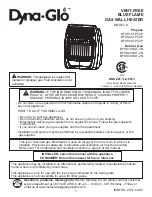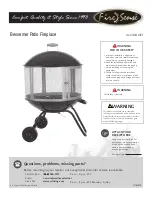
Page 13 of 16
15.
Flue Gas Analysers – Installation & Servicing Facts
•
Please read this sheet even if you have fitted our fires before.
•
Please leave this sheet with the customer as reference for future servicing of the
appliance.
•
Please explain to the customer how the fire works and the details and facts listed on this
sheet, particularly what the catalyst does and doesn’t do.
•
If you have any doubts about the test procedure please visit our website or call our
technical help line
Testing – Points to note…
•
Before testing ensure that the room size is correct for the heat output of the fire. 30cu³
for 2.5kw output, 40cu³ for 3.5kw and 50cu³ for 4.5kw.
•
In all installations regardless of room size there must be an air vent positioned at least
one metre from the fire at either high or low level through an outside wall providing
100cm² of free air. (For the Republic of Ireland 2 vents of not less than 60cm² must be
provided at high and low level, with minimum vertical separation of 1.6m).
•
The analyser used must be manufactured to BS7967 and the test must be carried out in
accordance with BS5871 Pt 4
•
The catalytic converter needs heat to work, therefore before you start testing; the fire
must have been lit and burning on full for at least 15 mins.
There are two tests to carry out. A Co / CO² ratio test and a room centre CO test.
1.
The first test is the CO / CO² ratio test and should be carried out at the fire exhaust vent,
do not stick the probe of the analyser in through the grill but move the probe back and
forth 1 inch in front of the outlet grill. (We use a piece of perforated 8mm pipe attached
to the analyser with flexible rubber tube). You should record a ratio of no more than
0.002 % (20ppm CO to 1% Co²). It is advisable to have a high sample of CO as this will
improve the test
2.
The second test is the room centre CO test. You should stand in the room centre with the
probe at waist height and read the level of CO; this should be no more than 9ppm over
ambient peak. Please record these readings on the customers guarantee card.
Our Flueless fires also contain the following safety devices (an ODS (Oxygen Depletion Sensor)
and FSD (Flame Supervision Device). Point out to the customer that unfortunately these are not
found on all gas hobs; which are also flueless devices)


































